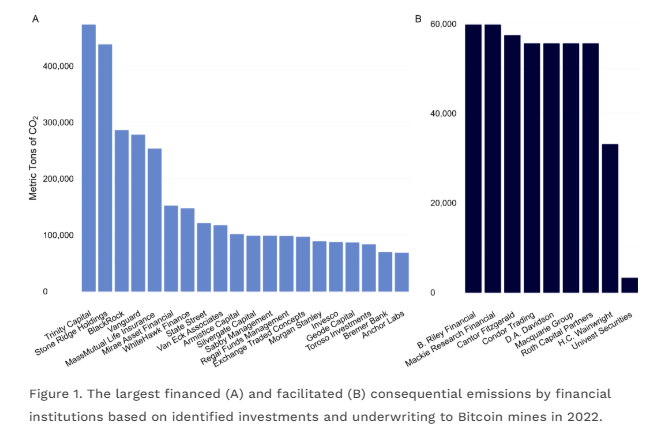[ad_1]
The ever-growing popularity of crypto has come under fire once again, this time for its environmental cost. A new report by Greenpeace casts a critical eye on the energy consumption of Bitcoin mining, pointing a finger directly at Wall Street financiers who back the industry.
Wall Street’s Dirty Little Secret?
The report argues that traditional financial institutions are deeply intertwined with the environmental impact of Bitcoin mining. While Bitcoin itself operates on a decentralized network, the massive mining facilities required to secure the currency are funded and supported by Wall Street giants.
Despite the myth of Bitcoin being independent from traditional finance, the report states, the industry relies heavily on banks, asset managers, and venture capitalists for the capital it needs to function.

Source: Greenpeace
Greenpeace identifies several major financial institutions, including BlackRock and Vanguard, as being top financiers of Bitcoin mining companies in 2022. The report calculates that these institutions, along with others, are indirectly responsible for over 1.7 million metric tons of CO2 emissions – equivalent to the annual electricity use of hundreds of thousands of homes.

Source: Greenpeace
Is Proof-Of-Work The Problem?
The crux of the environmental concern lies in Bitcoin’s core technology – Proof-of-Work (PoW). This system relies on a vast network of computers solving complex mathematical puzzles to validate transactions and secure the network. The more computing power dedicated to the network, the more secure it becomes, but this also translates to a massive demand for electricity.
Greenpeace argues that the PoW system is simply unsustainable in the face of climate change. They propose a shift towards alternative consensus mechanisms, such as Proof-of-Stake, which rely on significantly less energy.
Total crypto market cap at $2.30 trillion on the daily chart: TradingView.com
However, some industry experts caution against a hasty switch. Proof-of-Work has proven to be incredibly secure for Bitcoin over the years. Shifting to a different system could introduce new vulnerabilities that we haven’t even considered yet.
Finding A Sustainable Future: Can Crypto Go Green?
The debate around Bitcoin’s environmental impact is far from settled. While Greenpeace raises valid concerns about Wall Street’s role and the inherent energy inefficiency of PoW, there are other factors to consider.
Some Bitcoin mining companies are increasingly turning to renewable energy sources like solar and geothermal power. Additionally, research is ongoing into ways to optimize the PoW system itself to reduce its energy footprint.
The future of Bitcoin depends on a few key actions. Miners and financial institutions need to be more transparent about their energy use. It’s important to explore new mining methods and regulate energy sources. The main challenge is ensuring Bitcoin can grow without harming the environment.
Featured image from Greenpeace, chart from TradingView
[ad_2]
Source link



